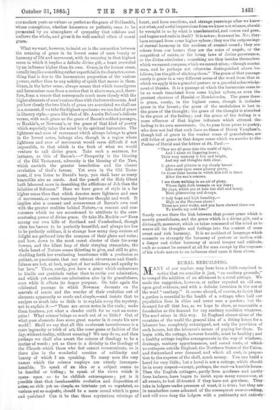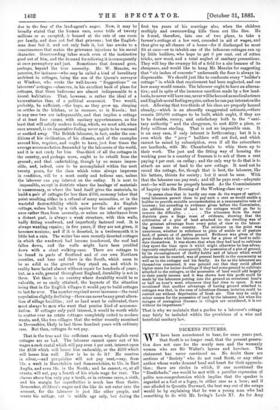RURAL REBUILDING-.
MANY of our readers may have been a little surprised to notice that we consider it jnst, "on sanitary grounds," to compel the addition of an allotment to a rural cottage. We made the suggestion, however, or rather repeated an old one, upon good evidence, and with a definite intention in the use of the word "sanitary." It seems absurd, of course, to insist that a garden is essential to the health of a cottage, when half our population lives in cities and never sees a garden ; but the- demand for all that has, as we hope to show, as reasonable:a . foundation as the demand for any sanitary condition whatever. The need arises in this way. In England almost alone of the countries of the world the general idea of a fitting house for-a labourer has completely outstripped, not only the provision of such houses, but the labourer's means of paying for them. To begin with,. the cottage, however humble, must be healthy; and a healthy cottage implies arrangements in the way of windows, drainage, sanitary appurtenances; and sound rode, of which-- no cottazers outside England, the Northern States of the Union; and Switzerland ever dreamed, and which all cost, in propor- tion to the expense of the shell, much money. You can build a hovel for very little; but a hovel is not a cottage, which should be in every respects—except, perhaps, the roof—a humble house Then the English cottagers, partly from goodness, and. partly- from badness, have begun to insist upon many-rooms--or, at all events; to feel ill-treated if they have not gotsthem. They- take in lodgerseunder pressure of want, it is true; but they are- in numberless cases ashamed of the consequent over-crowding, - and- will even deny the lodgers with a pertinacity not entirely--
due to the fear of the laud-agent's anger. Now, it may be broadly stated that the human race, some trifle of twenty millions or so excepted, is housed at the rate of one room per family, and does not feel that grievous ; but the English- man does feel it, and not only feels it, but has awoke to a consciousness that makes the grievance injurious to his moral character. Overcrowding takes much even of the instinctive good out of him, and the demand for relieving it is consequently at once peremptory and just. Sometimes that demand goes, perhaps, beyond the true necessity. Mr. W. Menzies, we perceive, for instance—who may be called a kind of hereditary architect in cottages, being the son of the Queen's surveyor at Windsor, who wrote the well-known " Suggestions " on labourers' cottages—observes, in his excellent book of plans for cottages, that three bedrooms are almost indispensable to a decent habitation. That, however, is rather the ideal of a humanitarian than of a political economist. Two would, probably, be sufficient,—the boys, as they grow up, sleeping on settles in the kitchen, or in recesses, as in Russia ; but in any case two are indispensable, and that implies a cottage of at least four rooms, with sanitary appurtenances, as the least that will satisfy modern feeling, which, we must add, when once aroused, is an imperative feeling never again to be reasoned or soothed away. The British labourer, in fact, under the con- ditions of his civilisation, of his climate, and of the examples around him, requires, and ought to have, just four times the average accommodation demanded by the labourers of the world, and it is not ready for him. One-third of all the cottages in the country, and perhaps more, ought to be rebuilt from the ground ; and that undertaking, though by no means impos- sible, and, indeed, sure to be accomplished within the next twenty years, for the class which votes always improves in condition, will be a most costly and tedious one, unless the labourer can pay interest on the outlay. It is next to impossible, except in districts where the haulage of materials is unnecessary, or where the land itself gives the materials, to build a pair of cottages for less than £300, economy below that point resulting either in a refusal of many necessities, or in the wasteful destructibility which now prevails. An English cottage, unless built by a rich squire for the sake of appear- ance rather than from necessity, or unless an inheritance from a distant past, is always a weak structure, with thin walls, badly fitting woodwork, and imperfectly fastened roof: It is always wanting repairs; in five years, if they are not given, it becomes noxious ; and if it is deserted, in a twelvemonth it is little but a rain. The writer has seen recently deserted cottages in which the weedwork had become touchwood, the roof had fallen down, and the walls might have been prodded down with a stout walking-cane. There are cottages to be found in parts of Scotland and of our own Northern counties, and here and there in the South, which seem to be as solid as the ground they stand on, and which in reality have lasted almost without repair for hundreds of years; but, as a rule, general throughout England, durability is not in them. Yet there is no country where durability would be so valuable, or so easily attained, the keynote of the situation being that in the English villages it would pay to build cottages to last for ever. The number required never increases—the rural population slightly declining—there can never be any great altera- tion of village localities ; and as land must be cultivated, there must always be men who want that precise kind of accommo- dation. If cottages only paid interest, it would be worth while to scatter over an estate cottages completely suited to modern wants, and, like two villages that the writer recently examined in Devonshire, likely to last three hundred years with ordinary care. But then, cottages do not pay.
That is the true and the sufficient reason why English rural cottages are so bad. The labourer cannot spare out of his wages a cash rental which will pay even 4 per cent. interest upon the £150 which will house him endurably, or the £200 which will house him well, How is he to do it? He receives in silver,—and perluisites will not pay rent,—say, from 128. a week in Dorsetshire and Somersetshire, to 15s. in East Anglia, and even 16s, in the North; and he cannot, or, at all events, will not, pay a fourth of his whole wage for rent. The classes above him only pay a tenth, or in extreme cases, a sixth, and his margin for superfluities is much lees than theirs. Remember, children's wages and the like do not enter into the account, for the labourer is just like other people, and wants his cottage, not in middle age only, but during the first ten years of his marriage also, when the children multiply and overcrowding kills them out like flies. He is ft reed, therefore, into one of two plans, to take a farmer's cottage at a low rent, conceded in aid of wages, and thus give up all chance of a home—for if discharged he must flit at once—or to inhabit one of the infamous cottages run up by little builders, who hope to get 6 per cent, out of rotten bricks, new wood, and a total neglect of sanitary precautions. They will buy the swampy bit of a field for a site because of its cheapness, and would like to hang Mr. Menzies for suggesting that "sir inches of concrete" underneath the floor is always in- dispensable. We should just like to confiscate every "builder's cottage" in which that requirement had been neglected, and see how many would remain. The labourer ought to have an alterna- tive; and in spite of the immense sacrifices made by a few land- lords, he never will have one, never will be housed as medical science and English moral feeling require, unless he can pay interest on the cost. Allowing that two-thirds of his class are properly housed already,—which is an absurdly exaggerated estimate,—there remain 200,000 cottages to be built, which ought, if they are to be durable, roomy, and satisfactory both to the "sani- tary authority" and the clergyman, to cost £200 a piece, or forty millions sterling. That is not an impossible sum. It is an easy sum, if only interest is forthcoming ; but it is a sum which the " Jerry " builders will not find, and which cannot be raised by subscription, even if all the subscribers are landlords, with Mr. Chamberlain to whip them up to their work. The just and the fitting way of housing the working poor in a country of freemen is to ask of them a rent paying 4 per cent. on outlay; and the only way to do that is to attach an acre of land to the new cottage. It need not be round the cottage, for, though that is best, the labourer, like his betters, thirsts for society ; but it must be near. With that the labourer can pay rent ; and till he pays rent—adequate rent—he will never be properly housed. As the Commissioners of Inquiry into the Housing of the Working-class say :—
"It seems clear that in hardly any case do the wages of agricul- tural labourers permit them to pay such a rent as would enable a builder to provide suitable accommodation at a remunerative rate of interest ; but according to evidence given before the Commission, the addition of plots of land to the cottages would go far to
remove the difficulty The witnesses from the rural districts gave a large mass of evidence, showing that the cultivation of a plot of land attached to the dwelling was of the greatest advantage from every point of view to the labour- ing classes in the country. The evidence on the point was unanimous, whether in reference to plots of arable or of pasture land, of potato or of garden ground. Evidence was given of the great desire which the labourers have for a piece of land to culti- vate themselves. It was shown that when they bad land to cultivate they spent the time upon it which might otherwise be less advan- tageously employed; consequently, the possession of a plot of ground, by its encouragement of thrifty habits and of labour which would otherwise not be exerted, was of general benefit to the community as well as to the cottager and his family. As far as the labourers are themselves concerned, it was pointed out that they could afford higher rents for better dwellings if they had some ground to cultivate attached to the cottages, as the possession of land would add largely to their yearly income and it was shown how this profit could be made by the labourers putting into the ground an occasional hour's or half an hour's work whenever they had time to spare. It was mentioned that another advantage of having ground attached to cottages was that, in the case of infections disease, isolation could be carried out without deprivation of fresh air. This may be only a minor reason for the possession of land by the labourer, but when the ravages of contagious illnesses in villages are considered, it is not without its importance."
That is why we maintain that a garden to a labourer's cottage may fairly be included within the provisions of a wise and beneficial sanitary law.







































 Previous page
Previous page